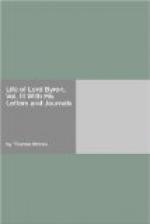is in the way, it is some years since I felt
a long anger. But, undoubtedly, could I,
or may I, trace it to a man of station, I should
and shall do what is proper.
“* * was angerly, but tried to conceal it. You are not called upon to avow the ‘Twopenny,’ and would only gratify them by so doing. Do you not see the great object of all these fooleries is to set him, and you, and me, and all persons whatsoever, by the ears?—more especially those who are on good terms,—and nearly succeeded. Lord H. wished me to concede to Lord Carlisle—concede to the devil!—to a man who used me ill? I told him, in answer, that I would neither concede, nor recede on the subject, but be silent altogether; unless any thing more could be said about Lady H. and himself, who had been since my very good friends;—and there it ended. This was no time for concessions to Lord C.
“I have been interrupted,
but shall write again soon. Believe me
ever, my dear Moore,”
&c.
* * * * *
Another of his friends having expressed, soon after, some intention of volunteering publicly in his defence, he lost no time in repressing him by the following sensible letter:—
LETTER 169. TO W * * W * *, ESQ.
“February 28. 1814.
“My dear W.,
“I have but a few moments to write to you. Silence is the only answer to the things you mention; nor should I regard that man as my friend who said a word more on the subject. I care little for attacks, but I will not submit to defences; and I do hope and trust that you have never entertained a serious thought of engaging in so foolish a controversy. Dallas’s letter was, to his credit, merely as to facts which he had a right to state; I neither have nor shall take the least public notice, nor permit any one else to do so. If I discover the writer, then I may act in a different manner; but it will not be in writing.
“An expression in your letter has induced me to write this to you, to entreat you not to interfere in any way in such a business,—it is now nearly over, and depend upon it they are much more chagrined by my silence than they could be by the best defence in the world. I do not know any thing that would vex me more than any further reply to these things.
“Ever yours, in haste,
“B.”
* * * * *
LETTER 170. TO MR. MOORE.
“March 3. 1814.
“My dear Friend,




